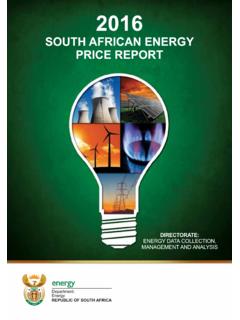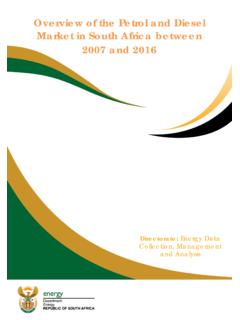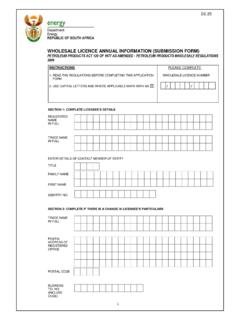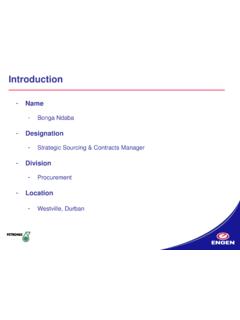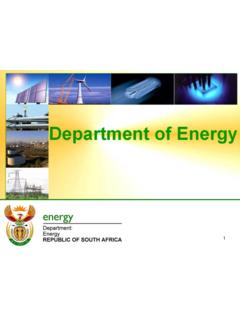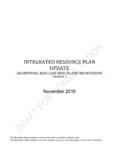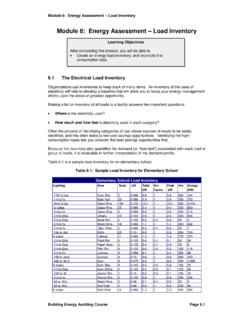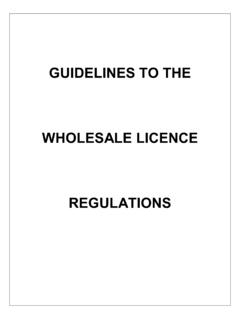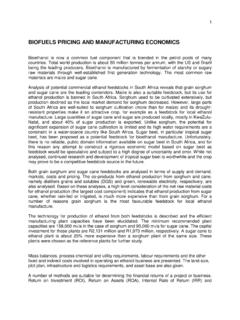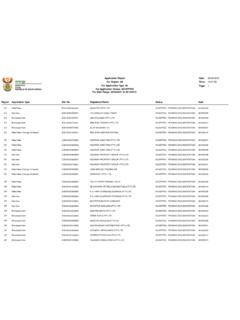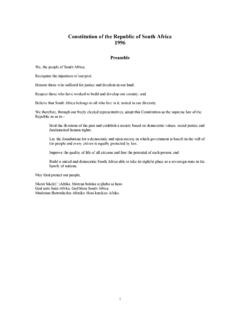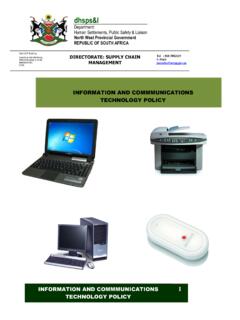Transcription of White Paper on the Energy Policy of the Republic of …
1 1 White Paper on the Energy Policy of the Republic of south africa December 1998 Department of Minerals and Energy Private Bag X59 Pretoria 0001 Tel: (012) 317-9000 Fax: (012) 322-3416 1998, Department of Minerals and Energy ISBN: 0-9584235-8-X TABLE OF CONTENTS 1 Ministerial foreword 2 Deputy Minister s foreword 3 Executive Summary Introduction Part 1: Context, Objectives and priorities for Energy Policy Part 2: Demand Sectors Part 3: Supply Sectors Part 4: Cross-Cutting Issues 4 Introduction The need for a new White Paper on Energy Policy The process of Energy Policy formulation The approach to Policy formulation The expression of Policy 5 Part 1: Context, Objectives and priorities for Energy Policy The context for Energy Policy Energy sector Policy objectives Short-term Policy priorities Medium-term Policy priorities 6 Part 2: Demand Sectors Households Industry, commerce and mining 2 Transport Agriculture 7 Part 3: Supply Sectors Electricity Nuclear Energy Oil and gas: exploration and production Liquid fuels Gas Coal Renewable Energy sources 8 Part 4.
2 Cross-Cutting Issues Integrated Energy planning Statistics and information Energy efficiency Environment, health and safety Research and development Human resources Capacity building, education and information dissemination International Energy trade and co-operation Fiscal and pricing issues Governance and institutional capacities 9 Appendices White Paper consultations Documents produced and circulated Submissions in response to the Energy Policy discussion document Release of draft White Paper Submissions in response to the draft White Paper approval of the White Paper on Energy Policy by cabinet 1. Ministerial foreword south africa is a country endowed with abundant Energy resources. Fossil fuels, such as coal, uranium, liquid fuels, and gas, play a central role in the socio-economic development of our country, while simultaneously providing the necessary infrastructural economic base for the country to become an attractive host for foreign investments in the Energy sector.
3 Biomass forms the main Energy source in the rural domestic sector, while other renewable Energy development opportunities are already being explored in the fields of solar power, wind power, pumped storage and in hydro-power schemes. Successful tapping of all possible Energy carriers in our country is vital for sustainable economic growth and development. We are fortunate in south africa to be in a position to utilise such a broad spectrum of Energy carriers. Various economic sectors that contribute to the GDP of our country are practically driven by these Energy carriers. For instance, the manufacturing sector, which accounts for about 25% of GDP, and the mining industry, which accounts for about 10%, are both heavily reliant 3 upon electricity. In fact, industry as a whole consumes approximately 40% of the total electricity generated.
4 This means that electricity is one Energy carrier that makes a significant contribution to our economic growth and development. This is made possible by the fact that industry alone accounts for a sizeable proportion of local capital investment. As government pursues its macro-economic Policy on growth, employment and redistribution, as well as its Policy of reconstruction and development, changes take place within the Energy sector that continue to present us with interesting challenges. These challenges include the transformation of state-owned entities, the reshaping of governance principles, the enhancement of socio-economic welfare within communities, and even changing people s attitudes towards the use and importance of national Energy resources. Government is committed to the promotion of access to affordable and sustainable Energy services for small businesses, disadvantaged households, small farms, schools, clinics, in our rural areas and a wide range of other community establishments.
5 As provided for in our Constitution, the state must establish a national Energy Policy which will ensure that the national Energy resources shall be adequately tapped and developed to cater for the needs of the nation. Energy should therefore be available to all citizens at an affordable cost. Energy production and distribution should not only be sustainable, but should also lead to improvement of the standard of living for all of the country s citizens. For this to become a reality, the state should ensure that Energy production and utilisation are done with maximum efficiency at all times. In view of all of the above, our Energy Policy should preserve an appropriate balance between Energy demand and supply. It should pronounce itself on short, medium and long term priorities. It should also balance the use of natural Energy resources with environmental considerations.
6 The state should establish a clear difference between its primary role as a Policy making and regulatory entity of the Energy sector, and its secondary role as a facilitator in the supply of Energy services. This White Paper has been written so as to clarify government Policy regarding the supply and consumption of Energy for the next decade. The Policy strengthens existing Energy systems in certain areas, calls for the development of underdeveloped systems and demonstrates a resolve to bring about extensive change in a number of areas. It addresses international trade and co-operation, capacity building, and the collection of adequate information. The document is comprehensive, addressing all elements of the Energy sector as practically as it can. Considering the complexity of some of the priority Policy changes, it will not be possible to implement the whole body of new Policy in the short to medium term.
7 The executive summary gives an indication of the government s priorities. The White Paper was developed by an active process of consultation, beginning with the publication of the Energy Policy Discussion Document in August 1995. This process was concluded in December 1998 when Cabinet approved this White Paper as Government Policy on Energy . The Introduction and the Appendix give more information on this consultation process. The White Paper is intended for parliamentarians, those involved in the Energy sector and any other concerned and interested parties, including Energy suppliers, and consumers, employees in the Energy sector, researchers, academics, environmentalists, Policy makers, contractors, product developers and manufacturers. The White Paper takes a broad approach, but provides specific Policy statements on 4 what Government intends for the Energy system as a whole.
8 It does not attempt to deal with strategies, for implementation. Indeed, such issues are part of the core functions of my Department. It should be borne in mind that my Department is not dealing with Energy matters from a greenfields approach. We are continuously engaged in strategic planning and review regarding the implementation of our functions in the delivery of Energy systems to communities in the country on a day-to-day basis. The White Paper will not therefore serve as a means to re-invent the wheel , but will constitute a formal framework within which the Energy sector will operate within the broad national strategy for reconstruction and development. It will serve to bring more focus and direction to what is already being achieved. This document is the product of an intense process in which a large number of dedicated people participated.
9 They are the authors of the Energy Policy Discussion Document, the organising committee of the consultation process, commentators on the Energy Policy Discussion Document and members of my Department, to list but a few. I would like to thank the Parliamentary Portfolio Committee on Minerals and Energy for having called public hearings and for the positive public response. The response on the draft White Paper by the public was also positive. The NEDLAC discussions have assisted in clarifying and understanding the Policy issues from labour and business perspectives and have enhanced the White Paper . Special thanks are due to the International Energy Agency and the United States Department of Energy for their dedicated evaluation documents, direct participation in a variety of workshops and detailed advice and support.
10 To all of you I would like to convey my thanks for the hard work that you have put into this important project. I trust that your reward will be to see that the Energy Policy that we implement in the future is the best one for our country. We want it to achieve our main goal: the socio-economic development of all our people. Dr P M MADUNA MINISTER OF MINERALS AND Energy 2. Deputy Minister s foreword Energy is the life-blood of development. Development is about reducing poverty and about increasing access to basic needs so as to allow people the freedom of self development. Communities do not exist in a vacuum but within a framework of government policies, laws and institutions. It is therefore incumbent on us to present an Energy Policy that will achieve our desired objectives. south africa has a relatively strong Energy supply industry, to the extent that we export Energy in the form of coal, electricity and liquid fuels.
